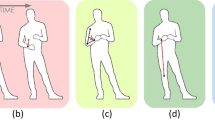Abstract
The majority of deception research to date has focused on deception in the context of dyadic communication. Among this body of research are efforts to identify what signals can be used to discriminate deceivers from non-deceivers. The general form of this research involves observing (typically recording to observe and/or manually code after the fact) relevant behaviors of individuals with ground truth knowledge of which individuals are deceiving and which are not. In this chapter, the general process is discussed, and considerations for extending it from dyadic to group observation are considered. Additionally, this chapter provides details of the particular implementation from which many results described in the remainder of this book are found.
Access this chapter
Tax calculation will be finalised at checkout
Purchases are for personal use only
Similar content being viewed by others
References
Hofstede, G. (1983). The cultural relativity of organizational practices and theories. Journal of International Business Studies, 14(2), 75–89.
Singelis, T. M., Triandis, H. C., Bhawuk, D. P., & Gelfand, M. J. (1995). Horizontal and vertical dimensions of individualism and collectivism: A theoretical and measurement refinement. Cross-Cultural Research, 29(3), 240–275.
Zhou, L., Sung, Y., & Zhang, D. (2013). Deception performance in online group negotiation and decision making: The effects of deception experience and deception skill. Group Decision and Negotiation, 22(1), 153–172.
Acknowledgement
We are grateful to the Army Research Office for funding much of the work reported in this book under Grant W911NF-16-1-0342.
Funding Disclosure
This research was sponsored by the Army Research Office and was accomplished under Grant Number W911NF-16-1-0342. The views and conclusions contained in this document are those of the authors and should not be interpreted as representing the official policies, either expressed or implied, of the Army Research Office or the U.S. Government. The U.S. Government is authorized to reproduce and distribute reprints for Government purposes notwithstanding any copyright notation herein.
Author information
Authors and Affiliations
Corresponding author
Editor information
Editors and Affiliations
Rights and permissions
Copyright information
© 2021 Springer Nature Switzerland AG
About this chapter
Cite this chapter
Dorn, B. et al. (2021). A System for Multi-person, Multi-modal Data Collection in Behavioral Information Systems. In: Subrahmanian, V.S., Burgoon, J.K., Dunbar, N.E. (eds) Detecting Trust and Deception in Group Interaction. Terrorism, Security, and Computation. Springer, Cham. https://doi.org/10.1007/978-3-030-54383-9_4
Download citation
DOI: https://doi.org/10.1007/978-3-030-54383-9_4
Published:
Publisher Name: Springer, Cham
Print ISBN: 978-3-030-54382-2
Online ISBN: 978-3-030-54383-9
eBook Packages: Computer ScienceComputer Science (R0)




